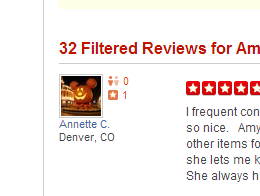Here’s Why You Should Ignore The Yelp Star Rating And Always Read Filtered Reviews Image courtesy of Filtered reviews can be more revealing than the published ones.

Filtered reviews can be more revealing than the published ones.
Take, for example, the Yelp page for this consignment shop in Colorado. It currently only has three posted reviews, two of which are very negative while the third is a five-star write-up. And it looks like that positive review wasn’t posted until after the store and its Yelp problems were featured on the local news.
So until that latest review was added, the store’s star rating on Yelp was a very poor single star, in spite of the fact that there are 32 reviews hidden behind the filter wall, which requires the user to actively click on a link and enter Captcha text to prove they are a human being.
The overwhelming number of these reviews behind the filter-wall are 5-star write-ups, which may lead some to believe they are fake or posted by the store owner. This is certainly not unheard-of and is one of the reasons Yelp began filtering reviews at all.
But a look through these particular reviews appears to show a group of customers attempting to support the business. So why are they filtered?
Yelp does not provide details of how its filters work, lest people game the system. However, CBS Denver believes that this case probably has something to do with the store mentioning the negative Yelp reviews on its Facebook page.
“We just wrote on Facebook, ‘Ouch, Yelp has given us two bad reviews. What do you ladies feel about that?’” the owner tells CBS.
Yelp frowns upon businesses that solicit reviews and mentioning the 1-star reviews to Facebook followers could be seen as a call to post reviews in response.
Now, we have no ties whatsoever to this consignment shop, nor do we have any idea if it’s a good store. But we do believe that not all of these reviews deserve to be filtered, especially since they appear to be written by local consumers, some of whom have previously reviewed other businesses in the area.
Regardless, it’s a reminder that the Yelp star rating may be completely meaningless and that those reviews hidden behind the filter-wall may reveal something closer to the truth.
And sometimes the truth revealed by the filtered reviews shows just how bad a company can be. You may remember the story of the moving company that threatened to sue a customer over a bad Yelp review. When the customer looked at the reviews behind the filter-wall, he found that a number of the positive ones appeared to be fakes, either that or the reviewers all happen to love this New England moving company, as well as the same small businesses in Hawaii and California.
Thus, we recommend that you should always read the full list of reviews on Yelp — and any other site that allows for public ratings — and keep the following in mind:
1. Ignore the Star Rating: Read the actual text of the review and decide for yourself whether this person is describing a business you want to deal with. People will write 5-star reviews without providing any supporting reasons, and people will also write 1-star reviews because they don’t like the paint color on the wall.
2. Research the Reviewer: If you think a particular reviewer might be deliberately trying to shill for or scuttle a business, check out their profiles. Do they have other reviews? Are the reviews for local businesses or are they for far-flung stores and services with no logical connection? Also look at the tone of their other reviews. If all they do is write positive reviews, they may be shilling for friends (or for profit), while someone with all negative reviews may not be a fake, but they may be someone who chooses to vent all their frustrations through overly negative write-ups.
3. Does the Business Owner Respond? A number of business owners will now reply to reviews by displeased customers. These replies will often offer a glimpse of how the business treats its customers. Are they short-tempered and defensive, or are they apologetic and looking to genuinely remedy the situation?
Want more consumer news? Visit our parent organization, Consumer Reports, for the latest on scams, recalls, and other consumer issues.

